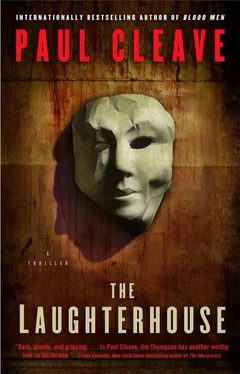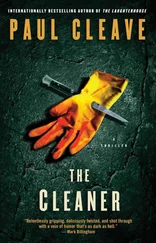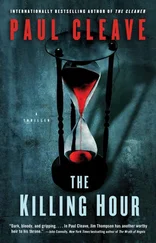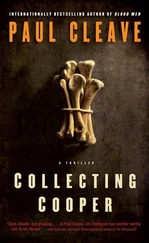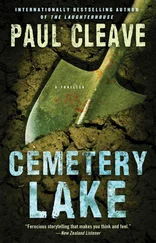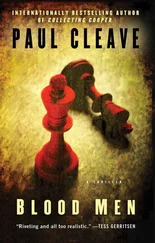Paul Cleave - The Laughterhouse
Здесь есть возможность читать онлайн «Paul Cleave - The Laughterhouse» весь текст электронной книги совершенно бесплатно (целиком полную версию без сокращений). В некоторых случаях можно слушать аудио, скачать через торрент в формате fb2 и присутствует краткое содержание. Год выпуска: 2012, ISBN: 2012, Издательство: Atria Books, Жанр: Триллер, на английском языке. Описание произведения, (предисловие) а так же отзывы посетителей доступны на портале библиотеки ЛибКат.
- Название:The Laughterhouse
- Автор:
- Издательство:Atria Books
- Жанр:
- Год:2012
- ISBN:9781451677959
- Рейтинг книги:5 / 5. Голосов: 1
-
Избранное:Добавить в избранное
- Отзывы:
-
Ваша оценка:
- 100
- 1
- 2
- 3
- 4
- 5
The Laughterhouse: краткое содержание, описание и аннотация
Предлагаем к чтению аннотацию, описание, краткое содержание или предисловие (зависит от того, что написал сам автор книги «The Laughterhouse»). Если вы не нашли необходимую информацию о книге — напишите в комментариях, мы постараемся отыскать её.
The Laughterhouse — читать онлайн бесплатно полную книгу (весь текст) целиком
Ниже представлен текст книги, разбитый по страницам. Система сохранения места последней прочитанной страницы, позволяет с удобством читать онлайн бесплатно книгу «The Laughterhouse», без необходимости каждый раз заново искать на чём Вы остановились. Поставьте закладку, и сможете в любой момент перейти на страницу, на которой закончили чтение.
Интервал:
Закладка:
He just starts telling us about something his son managed to jam into his ear when his cell phone goes off. He has to pat down his pockets looking for it, missing it the first time through. He answers it and I can hear another one ringing. And another. Detectives across the room are patting at their pockets, then there’s a chorus of people saying their names, including Detective Kent. The room goes quiet as people start listening. Schroder has one hand on the bar to keep himself steady. He stares at his beer, then slowly pushes it away. Rebecca puts her new drink-still untouched-onto the bar. People start hanging up, then another round of cell phones start ringing, a new set of detectives being called. News is flooding in from somewhere. Other detectives are finishing off their drinks in final gulps and heading toward the door, others to the bathroom. Schroder hangs up. “Call us some taxis,” he says to the bartender.
“What’s happened?” I ask him, following him to the door.
“You’re sober, right?”
“Right.”
“And your car’s here, right?”
“Right.”
“Then give me a lift and I’ll explain on the way.”
CHAPTER THREE
Caleb Cole is excited. He doubts the old guy is going to remember him, but he’ll get there with some explaining. He wasn’t sure what to get him; he did wonder if flowers would be appropriate before deciding it would just be a little weird. Showing up empty-handed would be just as strange, so he settled on a six-pack of beer, which he decided was perfect. He wasn’t sure what Albert drank, but figured at Albert’s age it probably wouldn’t matter too much. Beer, wine, he guesses one type tastes like any other when you’re closing in on a hundred. Not that Albert is a hundred, but he’s certainly closer to a hundred than he is to fifty.
He parks outside the retirement home. He doesn’t know if driving in will be enough to wake half of the residents even though it’s only seven thirty, or whether it’d be like waking the dead, which in a place like this would be a pretty neat trick. He carries the beer and straightens the fresh shirt he put on only half an hour ago, after taking a shower. The rain is coming and going-one moment it’s there, the next it’s gone.
He’s never stepped foot in a retirement community before today. No reason to. His parents both went to one for almost ten years before they died, but he never visited them, and he doesn’t have any uncles or aunts that he’s kept in touch with. His grandparents-well, half of them were dead before he was born, and the other half not long after. Looking around, the retirement community feels like exactly what it is-a holding pattern for old people between this world and the next. All the homes are made from brick with aluminum windows and are well insulated. They’d stay warm in the winter and cook anything inside in the summer, but they all look the same, and he struggles for a few minutes to figure out exactly which one he’s supposed to be heading to. Once he thought it was the kind of place he and Lara would end up living in. The kids would get sick of looking after them and put them into a home. They would grow old together, dreading that day when one of them got sick, picked up pneumonia or a lung infection to complicate the matter, then say goodbye.
He finds the right unit. There are lights on inside. He feels nervous. He tucks the beer under one arm and knocks on the door. He can hear a TV going inside, but nothing else.
He knocks again. “Albert?”
Nothing. He walks around the unit and is able to peek through a gap in the curtain and into the living room. Albert is facing away from him, toward the TV, of which they both have a clear view. Turns out the world is full of reality shows these days. He wonders if his own life would ever make for good reality TV, and decides it probably wouldn’t. It would, for lack of a better word, be too real. Albert is sitting on a couch with patterns of flowers on it. There is a machine next to him that looks like a dehumidifier, only there’s a clear tube leading from it to Albert, providing him oxygen.
Caleb taps on the window.
Albert jumps a little, then turns toward the sound. It’s obvious he can’t see anything beyond the window, so Caleb taps on the window again, then moves to the door. He knocks and waits, and a few seconds later the front door opens.
“Yes?”
“Albert McFarlane?” Caleb says.
“Yes, that’s right,” Albert answers. He’s bald with ears that are pushed out slightly wider than normal because of the oxygen tube going over them and tucking into his nose, which is red and looks irritated. When he talks, he wheezes, and the effort is making him puff hard. He puts a finger on the bridge of his glasses and pushes them a little closer to his eyeballs, so close the lenses must nearly touch. His eyes narrow as he focuses on the way everything has just been magnified.
“My name is Caleb Cole,” Caleb says, “do you remember me?”
“Remember you?” Albert leans forward and takes a closer look. “Are you one of my grandchildren?”
Caleb shakes his head. “No. Do you mind if I come in?”
“Are you trying to sell me something, son?”
He lifts up the beer. “No. I just wanna shoot the breeze,” he says, figuring the term will make Albert happy.
“Ah huh, well that’s mighty good, son, but I still don’t remember you, and I don’t drink beer anymore. Doctor’s orders. But hell, it’s not like I got much more to do, so sure, come on in.”
Albert steps aside and Caleb walks in and closes the door behind him. Albert’s clothes are hanging from his body with all the shape of laundry hanging on the line, and he’s squinting, as if trying to see past the cataracts clouding his vision. He doesn’t look well. Caleb has seen people with cancer before, and that’s exactly what it looks like Albert has.
“Take a seat,” Albert says. “Can I make you a coffee?”
“Sure, thanks,” Caleb says, and he sits the beer on the coffee table and makes a mental note to take it with him since Albert doesn’t want any. He follows Albert into the kitchen, which isn’t far since it’s effectively part of the living room. The oxygen tube looks long enough to hang somebody a few times over.
“Kettle just finished boiling a few minutes ago,” Albert says, then reaches up into the cupboard for a cup. “How do you like it?”
“Strong,” Caleb says. “No sugar. No milk.”
“Well, that I can do.”
The house is small. From the space between the kitchen and living room he can see down the hallway. It’s not a complicated layout. A bedroom, a toilet, a bathroom, not much else. It looks like a lonely life, and he guesses that’s just the way it goes when you get to this age. It’s not like people are dancing in the streets. Hell, nobody even saw him come in here and no doubt nobody will see him leave either. People in this community can only see about thirty feet ahead and fifty years into the past and not much else.
“What did you say your name was again?” Albert asks.
“Caleb Cole,” he says.
“And we know each other,” Albert says.
“This is your family?” Cole asks, looking at some of the photographs in the room. There are pictures of a lady in most of them, she ages at the same rate as Albert, then disappears. There are children and grandchildren. The living room is full of the knickknacks of life. There’s a cordless phone on a small table to the side of the couch, the phone large and heavy and perhaps one of the first ever built. The TV is on mute, but the oxygen machine is humming like a fridge. He wonders how Albert can sleep at night with it running.
“Yep.”
“You see them much?”
“Huh! You’ve got to be kidding. Here,” Albert says, and slides a coffee along the bench toward Caleb. It’s hot. He picks it up and both men sit down in the living room, and Caleb rests the coffee on the table next to the beer.
Читать дальшеИнтервал:
Закладка:
Похожие книги на «The Laughterhouse»
Представляем Вашему вниманию похожие книги на «The Laughterhouse» списком для выбора. Мы отобрали схожую по названию и смыслу литературу в надежде предоставить читателям больше вариантов отыскать новые, интересные, ещё непрочитанные произведения.
Обсуждение, отзывы о книге «The Laughterhouse» и просто собственные мнения читателей. Оставьте ваши комментарии, напишите, что Вы думаете о произведении, его смысле или главных героях. Укажите что конкретно понравилось, а что нет, и почему Вы так считаете.
